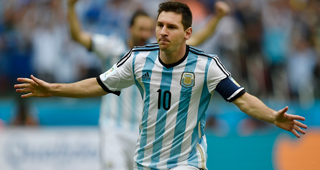Before Uruguay played Italy in the final match for Group D last Tuesday, there was a question as to whether 2014 was the greatest World Cup ever. The excitement was high, with the group stages featuring the most goals per game since the 1970 World Cup.
Then, in the 80th minute of a 0-0 draw, Luis Suarez bit into Italian defender Giorgio Chiellini’s shoulder, his third time biting an opponent in four seasons. His madness immediately reached all corners of the world (bookmakers placed the odds of Suarez biting a player at 175 to 1). Uruguay center back Diego Godin scored the game winning header a minute later. After the match, Andrea Pirlo’s retired (maybe). Cesare Prandelli resigned as Italian manager. Daniele De Rossi said Italy needed a side of “real men”. Suarez was banned from all FIFA activity for four months. No one exited that stadium in Natal unharmed. Suarez, in effect, had bitten into the forbidden apple.
Group D should have been about Costa Rica winning on seven points. You could say they got lucky in winning their first match against Uruguay, playing without Suarez due to injury. Beating a 10-man Uruguay is one thing, besting a full strength Italian squad with Pirlo and Balotelli another, and the shoe would eventually drop. But after Costa Rica striker Bryan Ruiz snuck in a header in the 44th minute, the side intelligently held their clean sheet in the second half. With six points, they were guaranteed to advance in a seemingly impossible group. Their final match, a 0-0 draw against England’s youth, was a formality. The odds of Costa Rica winning the group was +5000. Foresight does pay off.
Of course, the initial question of the group stage’s greatness is a product of Twitter’s immediacy. But there were goals of all sorts - off superman headers (Robin Van Persie), off 40 yard volleys (Tim Cahill), off stoppage time corners (John Brooks), off counter attacks (Xherdan Shaqiri over and over again), and off 40 yard runs (James Rodriguez). The 136 total goals scored in the group stages were just one less than the amount of goals scored at South Africa in 2010.
Suarez ethics aside, Brazil, Chile, and Colombia lead much of the excitement, and their success may be no surprise with the tournament held on the home continent. The round of 16 matches on Saturday between Brazil and Chile, and Uruguay and Colombia, are disappointing - those matchups should take place later in the knockout rounds.
Regardless, Neymar answered the weight of a home country’s expectations with four goals, tying him for the Golden Boot lead with Messi and Thomas Muller. Led by Alexis Sanchez, Chile continue to stake their claim as the most exciting side in the world. And perhaps the biggest revelation of the group stages has been Colombian playmaker James Rodriguez (not pronounced “James”). Colombia scored 9 goals in the group stages and had the best celebration thus far. There must be some medal for most viral celebration.
And we haven’t discussed Messi, who’s playing with the pressure of a place in history. He’s won every other trophy multiple times, and it’d be a shame if not winning the World Cup was his only stain. What contemporary athlete do we expect more from than Messi? We present him with the most difficult puzzles our imaginations can think of, and make him solve them with quick feet and a change of pace as his only tools. Whereas Suarez is driven by balancing madness and brilliance, Messi calmly solves spatial challenges. With his individual goal against Bosnia and Herzegovina, his curler in extra time against Iran, and his free kick against Nigeria, he’s done the impossible and left Twitter speechless. We don’t try to describe his goals. We mash our keyboards and hit “tweet”; the world will understand.
In addition to the (or in conjunction with) the question of the tournament’s greatness, we have to ask another - why are the European sides struggling? This answer appears more easily explainable by us armchair managers at home. The sides are playing in hostile environments, far away from moderate temperatures. But Holland and France have had dominant performances and symbolically ended eras. Greece made it through to the next round only scoring two goals in three matches. That statistic is either the worst of pragmatism, or beautifully efficient. And there has to be a soft spot, or at least a smirk, at the thought of Greece scoring on a stoppage time penalty kick in the third and final match to move on.
So maybe the European question is a round about way of mourning Spain’s demise. The shock of Suarez, the surprise of Costa Rica, and South America’s quality aside, this is the biggest story of the tournament’s group stages. We barely said our goodbyes before those intricate triangles we grew accustomed to over the last six years were replaced by the quick counters of Rodriguez and acrobatics of Van Persie. Coupled with Pirlo’s retirement, the changing of the era feels complete.



